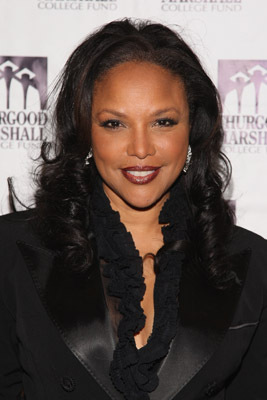Lynn Whitfield
ActressBiography
With roots that lead back to Louisiana southern aristocracy, lovely leading lady Lynn Whitfield was born in 1953, the eldest of four children and a third-generation BFA graduate from Howard University. Her dentist father was instrumental in developing Lynn’s initial interest in acting as he was a prime figure in forming community theater in her native Baton Rouge. She is of African American and Native American descent, specifically Cherokee. First garnering attention on the stage by studying and performing with the Black Repertory Company in Washington, D.C, she married one of the company’s co-founders and pioneers of black theatre, playwright/director/actor Vantile Whitfield in 1974. She eventually moved to New York and appeared off-Broadway in such shows as “The Great Macdaddy” and “Showdown” before earning acclaim in the 1977 Los Angeles production of the landmark black play “For Colored Girls Who Have Considered Suicide…When the Rainbow Is Enuf” co-starring Alfre Woodard. Lynn eventually became a force to be reckoned with intelligent and principled roles on quality film and TV as well Lynn’s Hollywood career unfolded under a talent development program at Columbia Pictures in 1979. Appearing on such established TV shows as “Hill Street Blues” and in a 1982 PBS version of her “For Colored Girls…” stage hit, she made her film debut with Doctor Detroit (1983) and doled out a number of support roles in other popular films as well such as Silverado (1985), The Slugger’s Wife (1985), Jaws: The Revenge (1987), and Dead Aim (1987). It was TV, however, that garnered her the most attention, working her way into top lead and co-star roles. The topical social dramas The George McKenna Story (1986) co-starring Denzel Washington, Johnnie Mae Gibson: FBI (1986) opposite Howard E. Rollins Jr. and Oprah Winfrey’s historical miniseries The Women of Brewster Place (1989) were her early highlights. In addition, she found some steadier work on series TV playing classy professionals, including two for ABC (a doctor in Heartbeat (1988) and a news anchorwoman in Equal Justice (1990).) The peak of her acclaimed career arguably came in the form of highly popular but deeply troubled Follies Bergere headliner-turned civil rights activist Josephine Baker. In the HBO biopic The Josephine Baker Story (1991), Lynn played the legendary entertainer with Emmy-winning gusto, a role that stretched her to the limits as she played the role from age 18 to 68. Earning an NAACP Image Award in 1992 for her role in the miniseries Stompin’ at the Savoy (1992), she later appeared in Pauly Shore’s comedy In the Army Now (1994) and went back to series TV alongside Bill Cosby in the short-lived The Cosby Mysteries (1994). Lynn had an upsurge in the late 90s with roles in the films A Thin Line Between Love and Hate (1996) with Martin Lawrence and Gone Fishin’ (1997) with “Silverado” co-star Danny Glover. She also earned excellent reviews for her supporting work in Eve’s Bayou (1997), a role that drew on her Louisiana heritage. More quality TV came her way when she starred as Sophie in Sophie & the Moonhanger (1996), a mini-movie that focused on the relationship of the wife of a Klansman and her longtime black housekeeper. She kept up the momentum with an unsympathetic role in the Oprah Winfrey miniseries The Wedding (1998), where she again had to cover a long life span, this time from 19 to 47, and Redemption (2004) with Jamie Foxx, an urban film that chronicled the turbulent life of (now) imprisoned L.A. Crips gang founder Stan “Tookie” Williams. More recent turns have come with a recurring role in the series Without a Trace (2002), a part in an updated version of Clare Boothe Luce’s The Women (2008) and a lead role opposite Ciara in the film Mama I Want to Sing (2011). Divorced from Vantile Whitfield in the late 70s, Lynn later married British director Brian Gibson in 1990, by whom she has a daughter, Grace. They parted ways in 1992.
Filmography
-
Movie Name
Ratings
-
Гринлиф
Драма
